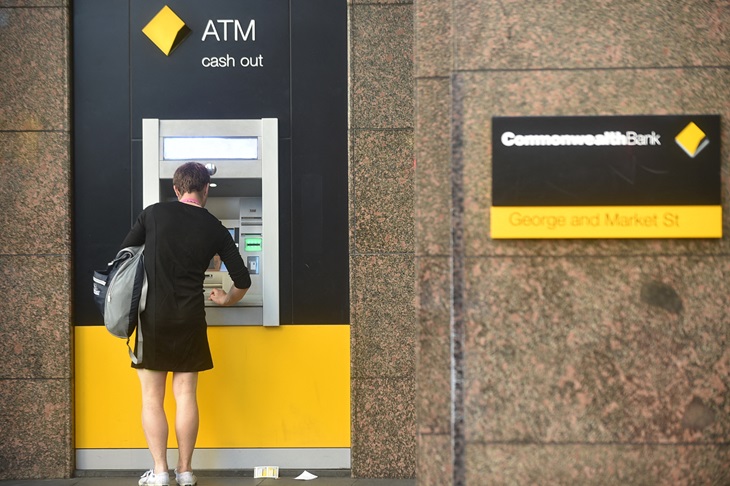Hands up if you’ve struggled to find an ATM lately… I don’t mean an overpriced service station ATM; I mean a free, big four banks ATM.
If you’ve struggled, you’re not alone.
The big four banks in Australia, namely ANZ, Westpac, the Commonwealth Bank, and the NAB, have not only been shutting down bank branches (around 460 branches in the past three years), they are also rapidly removing ATMs.
As of June 2017, there were 13,814 bank-owned ATMs across Australia. Six years later, in June 2023, there were just 5,693 – a decline of almost 60 per cent or 8,121!
Banks, the government, and corporate media will claim customers overwhelmingly prefer digital transactions, and they’re shutting down ATMs in response to the lack of demand for cash. I push back on this by asking: What came first, the inability to find an ATM, or a natural shift to online services?
Further, considering we were locked down in our homes for almost three years, I would’ve thought measuring outdoor-based consumer activity during this period would be fraught with difficulty.
Over the past few years, one of the main drivers toward digital transactions has been reframing cash as dirty and capable of spreading diseases such as Covid.
As someone who works in the service industry, I witnessed first-hand how successful this narrative proved in scaring people away from using cash. Retailers and businesses took this artificial marketplace signal as a cue to get rid of money permanently – a move many companies would applaud given the considerable costs involved in maintaining cash on the premises.
Offering cash as tender is expensive – from Armaguard collection to paying an accounts employee – not to mention the security costs involved in preventing internal and external theft. Businesses also prefer cards as they can add various surcharges. The ACCC currently has its hands full trying to rein in Australian businesses charging excessive credit card surcharges. Australian companies are legally obliged to charge customers the amount they pay to credit card companies, which is 0.5-3 per cent. Thus, businesses charging a flat surcharge for every transaction are not just ripping us off but also breaking the law.
Further, running and maintaining an ATM costs the bank money. Aside from the initial cost of purchasing the ATM, a suitably qualified person must physically stock the machine with cash and receipt paper. Then there are insurances, including public liability, rent charges, and the ongoing costs involved in anti-fraud software and hardware updates. It’s ridiculous to suggest that banks don’t minimise these costs as much as possible; nevertheless, there’s no doubt ATMs are expensive to maintain. All this highlights that ATMs and cash are no longer strong profit drivers for banks compared to digital products and services.
Indeed, any profits derived from ATMs disappeared in September 2017, when all four big banks stopped charging $2 transaction fees to non-customers using their ATMs. At the time, the banks collectively and accidentally ‘came out’ by stating in the media that they would accept the loss of $500 million in profit produced annually by charging ATM fees. This is interesting, as you will recall that up until that point in time, the banks had claimed that they did not make a cent of profit from ATM fees. For those more astute readers, you may have also noted the significance of the timing of this announcement. 2017 was the first year that ATMs started to disappear en masse…
In response to the rapid closure of bank branches and ATMs, many have suggested that we withdraw our cash at Woolworths, Coles, Aldi, or Australia Post. Okay, sure, that seems valid. However, the other day at my local Woolworths, I counted only two cash checkouts with withdrawal facilities and 12 card-only checkouts. We’re seeing the same scenario play out at Coles. Many Woolworths stores in metro locations across Australia conducted cashless trials as early as 2020. As for Australia Post, well, to achieve sustainability goals, it is currently shutting down local branches and creating regional hubs.
The situation at Aldi is worse. There are some newly opened Aldi stores across the United Kingdom and Europe that require you to scan a digital QR code with embedded digital ID tracking to enter the store. These stores are entirely autonomous, with no shop assistants, and cash is not accepted. Check it out HERE.
Imagine there’s nowhere to withdraw our money from, and a hiccup in the banking system were to occur, for example, a global banking crisis. Without ATMs or bank branches, it would be hard, if not impossible, to withdraw our savings. This, in turn, could lead to a situation known as a bank bail-in. Bank bail-ins are when a bank’s creditors and investors, i.e., you and I, are forced to take a loss on our holdings to recapitalise the bank during a financial crisis. This is a fancy way of saying the bank uses its customers’ savings to bail itself out of monetary issues, and yes, it’s 100 per cent legal.
Bank bail-ins were introduced in the wake of the 2008 global financial crisis to improve the stability of the international monetary system by screwing over the working and middle classes. And please don’t make the mistake of thinking that bank bail-ins only occur in corrupt third-world countries. They have occurred in Cyprus twice, once in 2013 and again in 2021, and in Italy and Spain in 2017. It’s yet another legal mechanism that allows the elites to steal our money to pay for their uncontrolled and unregulated greed.
The banks and government must be positively licking their lips at the unprecedented amount of consumer data falling into their laps at zero cost, with little to no oversight or pushback from the population. The ability of governments to track where their citizens are spending every dollar in the broader economy gives them extraordinary powers. When people use cash instead, that data cannot be captured or subsequently profited by selling it to third parties.
The collection of data on our spending habits is in addition to the ability of certain devices and applications to track our location, know who we’re dating, where we work, how much we earn, and our complete medical and tax histories. These apps, websites, and devices also read our emails, texts, and social media posts and listen to our phone conversations. So, now they will know how, when, and where we spend our money. This occurs even when our financial interactions are technically between us, our bank, and a third party. Imagine what it will be like when we’re all forced onto a government-controlled Central Bank Digital Currency (CBDC).
The government plans to fully integrate us into their new dystopian system of digital IDs and CBDCs by 2030. This will usher in a cashless era of control over everything we own and how, when, and where we spend every dollar. When you combine these mechanisms of control with existing Australian government digital infrastructure, such as the MyGov website, which centrally collates every citizen’s Medicare, Centrelink, and taxation information, the government’s digital surveillance box set will be complete.
This digital boxset represents what Harvard Professor Shoshana Zuboff has labelled the Dictatorship of no Alternatives. Whereby it is not only challenging to escape submitting to this regime, but it also becomes impossible to offer an alternative system. It’s a monopoly on power and information beyond anything previously imagined. Soon, CBDCs and a government-issued and controlled digital ID will become compulsory for living a normal life. This digital pass will be required to travel, sign a lease, open a bank account, apply for a mortgage, enrol your kids in school or university, visit the doctor or hospital, attend a concert, and get a new job. We will have no choice but to submit. Thus, the dictatorship of no alternatives is simply technofascism by another name.
This is all happening right now. The globalists are busy behind the scenes, rapidly dismantling the old financial system based on physical dollars and implementing a new digital ID and CBDC system, gamed to their advantage. One small way to push back against all this is to keep using cash. Sometimes, the simple things in life really do remain the best!
The advice in this article is general in nature and is not intended to influence readers’ decisions about investing or financial products. Before making any financial decisions, readers should always seek professional advice that considers their personal circumstances.
Got something to add? Join the discussion and comment below.
Get 10 issues for just $10
Subscribe to The Spectator Australia today for the next 10 magazine issues, plus full online access, for just $10.


























Comments
Don't miss out
Join the conversation with other Spectator Australia readers. Subscribe to leave a comment.
SUBSCRIBEAlready a subscriber? Log in